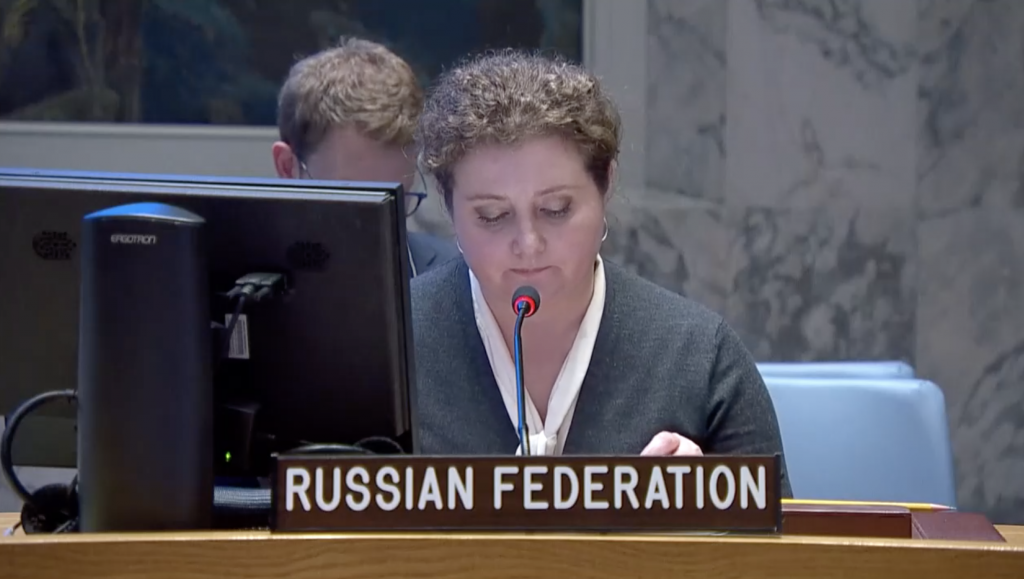Statement by Deputy Permanent Representative Anna Evstigneeva at UNSC briefing on security sector reform
Mr.President,
We thank ASG Zouev and AU Commissioner Adeoye for the meaningful briefings. We welcome Permanent Representatives of South Africa and Slovakia as Co-chairs of the Group of Friends of the Security Sector Reform. We are convinced that adequate state policy in establishing competent bodies of authority, security sector, and in particular effective armed forces are key for having a stable state and society.
Security sector is an important aspect underpinning a state’s security. That is why security sector reform always follows up on the national political process. The most effective will be a security sector that accounts for unique historical, cultural, political characteristic features of a society and serves the interests of the entire population. In developing countries, especially those in Africa, customs and institutions were often transplanted to post-colonial communities without account for national specifics, which constitutes a serious challenge today.
To be successful, security sector reform initiatives must be carried out by national forces, in fact rather than in word. National ownership is critical to the legitimacy, sustainability and effectiveness of SSR programs.
Even minimal success in transforming the security sector can bolster people’s trust in the authorities, create favorable conditions for return of the population to normal life, progressive social and economic activity, safe education.
Unfortunately, sometimes countries that have lived through conflicts are not capable of maintaining security and viable and effective state institutions without external support. In such cases a particularly important role is assigned to international assistance that must proceed from such fundamental principles as consent of host state, respect for its national sovereignty and political independence.
We agree with provisions of the Concept Note prepared by Mosambique as President that proposals on security sector reform must not base on hastily compiled provisions of agreements that do not take into account broader political arrangements about distribution of power authorities, historical and country-specific context of the formation of armed forces and security bodies, or that proceed from externally imposed recipes. Quite often, stringent deadlines that donors impose and their uniform approach undermine the fragile process of establishing state institutions that should maintain security. Sanctions, including those authorized by the Security Council, must not come in the way of the reform. All this must may lead to rejection of innovations. In the worst-case scenario, it may undermine the agreements, cause further fragmentation of the security sector and recurrence of conflict.
By all means, security sector reform must be carried out amidst broader recovery to include efforts at the political and socio-economic tracks. Only a holistic approach can give hopes for a lasting peace and security and guarantee a sustainable result.
Security sector reform is a resource-consuming process per se. But rather frequently, it is closely interconnected with a process that is no less complicated – disarmament, demobilization and reintegration. Timely financial support allows to resolve the existing and emerging problems more effectively. Yet it is obvious that allocation of funds must be long-term oriented and sustainable.
United Nations, first of all its peacekeeping and special political missions, play an important role in providing relevant international assistance to states. For example, many “early” peacebuilding issues are included in multidimensional mandates of peacekeeping operations. Peacekeepers play a key role in promoting the SSR, disarmament, demobilization, and reintegration, recovery of law enforcement bodies and the rule of law at large. Within the United Nations system, Office of Rule of Law and Security Institutions holds a special place at this track. The Office provides assistance to UN missions on the ground and also to states upon their request.
We also note the role of the Peacebuilding Commission in post-conflict recovery and in particular, the SSR. Elaboration of a comprehensive approach to the consultative and financial support of post-conflict countries boosts resilience of national security mechanisms, their accountability and professionalism. Potential of the Peacebuilding Fund as a flexible institution for financing SSR projects must not be understated either.
When providing assistance with SSR, efforts of various stakeholders must be well coordinated so the reforms and personnel training proceed from the same principles and approaches throughout the entire territory of the country.
Of course, international community should realize that such complex processes (especially in post-conflict environments) as reform of security sector and legal order require painstaking efforts, patience and a considerable period of time needed for a full-fledged recovery and functioning.
Thank you.
